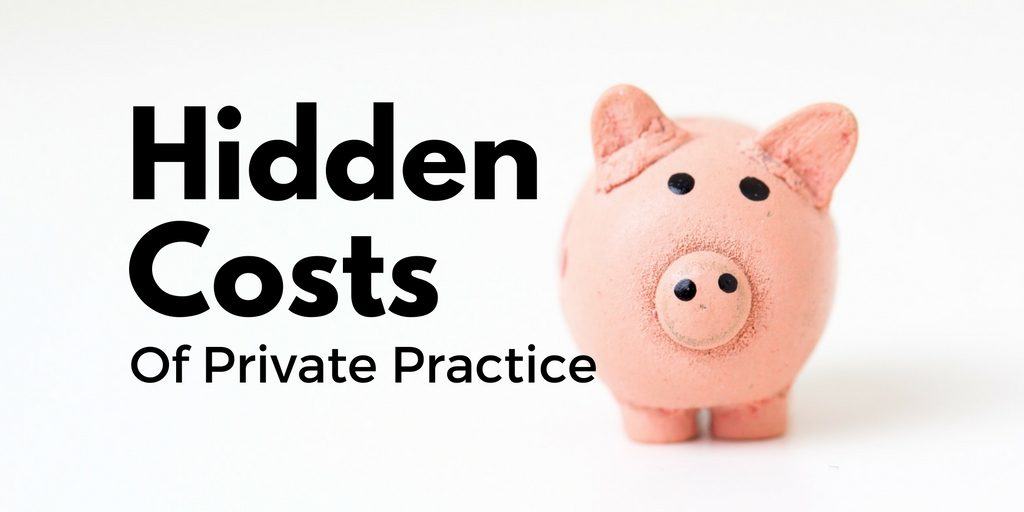 Most people know that whenever a person goes into business there are costs associated with keeping the business running. In private practice it is no different. When a person goes into private practice as a counselor, therapist, psychologist or other mental health clinician, there might be some costs that you are not aware of.
Most people know that whenever a person goes into business there are costs associated with keeping the business running. In private practice it is no different. When a person goes into private practice as a counselor, therapist, psychologist or other mental health clinician, there might be some costs that you are not aware of.
First of all, I am telling you about these “hidden costs” NOT to discourage anyone from going into private practice. Obviously I am a big advocate for private practice. Nonetheless, for anyone to run a practice efficiently and effectively, they need to know their “numbers” and understand their expenses. It is just good business practice.
Self-Employment Rocks!
One of the greatest things about being in private practice is that it allows you to be self-employed. Self-employment brings with it a great deal of freedom and liberation from being employed by an agency or someone else. It also requires a good bit of self-discipline and an ability to be a good self-starter. You also need to have the ability to hold yourself accountable and still approach the job as if you were working for someone else.
Planning ahead is key
The good news is that by preparing ahead of time, the challenges of being in private practice become rewarding and can give you a great sense of accomplishment. The hidden expenses become an asset and not a liability. In fact, some of hidden costs will serve to protect you and keep your practice running smoothly should you hit some rocky times.
Know how to manage your money well
A good place to start though is by having a good handle on your finances. If you struggle with knowing how to manage your money well, it is a good idea to educate yourself on this. Where many private practices fail within the first few years is because of the clinician not knowing how to manage their money; both personally and in their practices. A resource I can recommend on this is anything by the author Dave Ramsey. In particular, his book “Complete Guide To Money”will give you a good overview and understanding about money and how to manage it well.
The other part of managing your money in your practice is having a good way to track and document your income and expenses well. In other words, having a system in place to do your bookkeeping. A good tool for this is FreshBooks. FreshBooks is an cloud based accounting application that allows you to track your income and expenses and keep you organized.
So let’s jump into some of the hidden costs of running a private practice. Some of these you will probably know about. Others might not be so obvious for you.
Self-employment taxes
Being self-employed does not get your off the hook with the IRS. In fact it can create greater scrutiny with your income tax return. You do need to pay your taxes quarterly. Unlike it is when you are employed by someone else, you do not have tax withholding from your paycheck. In general, you need to pay 18-20% of your net income quarterly. And depending on which state you live in, it could be a bit more or a bit less.
Do check with a professional accountant on this to know the best way to handle your self-employment taxes. What you do not want to happen is be stuck with a huge tax bill at the end of the year. I would also highly recommend that you set aside money each month to go toward your taxes.
Health Insurance
Unless you are independently wealthy, we all need health insurance. Depending on your situation, you might be fortunate enough to have health coverage through a spouse or partner. If so this is good. If not, this is definitely something you will need to take care of.
Unfortunately there are no easy answers as to how to handle this. As things are now as I write this blog post, the health insurance marketplace is somewhat unsure. We have a new presidential administration coming in and how the Affordable Care Act is dismantled and re-written will have a large impact on small businesses.
Do check with trade organizations (ACA, AAMFT, NASW, etc.) to see what resources they might have. Also check with your local Chamber of Commerce to see if they have available.
Liability Insurance
Malpractice insurance is also a must. The good news is that this is something that is fairly inexpensive and affordable. And if you are going to be on insurance panels, you will have to have liability insurance. Also, some states might require liability insurance for you to maintain your licence. The cost of this determined by your experience level and the number of hours you work each week.
Two of the better knows providers of liability insurance are CPH Associates and HPSO. If you are a member of a trade organization, you can usually get discounted rates by being a member.
Renters Insurance
In addition to liability insurance, you might want to get renters insurance, especially if you are leasing an office space. There are two parts to this. One is “slip and fall” insurance which just protects you if someone were to somehow injure themselves while coming into your office. Alot of times this can be an add-on to your malpractice insurance.
The other type of renters insurance is to protect the contents of your office. If you were to have a fire or other natural disaster, you would want the contents of your office protected. Most home insurance companies can provide this for businesses as well.
Disability Insurance
This type of insurance is what you would have in place should you become unable to work due to a disability. For example, if you became ill or disabled and had to stay out of work for several months or weeks, this type of coverage would pay you. And if for some reason you became permanently disabled, this type of insurance coverage would give you an income until Social Security Disability was approved and took over.
One thing to consider here though is the importance of having money saved to keep you afloat should you not be able to see clients for any period of time. After all for private practice, if you are not seeing clients and having sessions, you do not get paid. Being able to have some resources in reserve is very important.
Practice Management System
This expense is something that is a necessity, especially as you grow. A practice management system is something that differs from an accounting system in that this is what you use to keep client documentation and track appointments. The good news with these systems is that they pretty much pay for themselves. They give you peace of mind and a way to keep client files organized. Many of them have automatic appointment reminders that are sent out which absolutely pays for itself. The cost of practice management systems can vary. But in general they cost $60-$80 a month depending on the provider. Here is one of the best reviews I have found on practice management systems: http://www.capterra.com/mental-health-software/
If you are filing insurance claims, practice management systems (aka- EHR- electronic health records) are a must. Once you have it setup, filing claims and getting reimbursed by insurance companies are simply a matter of clicking a few buttons.
Vacation Time
Taking time off is so important. We all need the time and space to recharge our batteries. You probably don’t tend to think of vacation time being part of the cost of being in private practice, but it is. As has already been mentioned, when you are not working or seeing clients you are not being paid. So in order to have “paid” vacation time, you need to factor that in. This is another reason why it is so important to save and set money aside.
Bank and Credit Card Charges
If you are taking credit cards (which I think is a good idea) for payment of your services, there is a cost involved. We don’t really think about it in terms of something we have to pay out, because we don’t have to write a check for it. But it is a cost. The good news about this expense is that it is tax deductible.
Retirement Savings
Finally, there is retirement to think about. This is something that is usually not too much on the radar screen when we are in our 20’s, 30’s or 40’s. As most financial experts will tell you, it is never to early to start thinking about retirement planning. Do check into this for yourself. Lots of resources out there on this topic. The key to this though is to save consistently for your retirement. Also put the money into something that will give you a return on your investment.like an IRA which will also save you on your taxes.
Consult With An Expert
Do take the time to learn about this and talk to an expert. Take the time to talk to a financial advisor who can point you in the right direction. Most financial advisors are paid by commission based on investment products they sell. So there is generally no upfront cost for you to talk to them. And for the most part, they will not try to sell you something that will not benefit you. They want you to gain financially which is also how they gain.
Whew! That’s a lot stuff to think about. Again, do not let this information intimidate or discourage you from private practice. All of this is very doable with the right planning and forethought. Consulting can help with the planning. By having the right things in place, you and your family are protected and you and your private practice will thrive!
 By L. Gordon Brewer, Jr., MEd. LMFT – Gordon is the President and Founder of Kingsport Counseling Associates, PLLC. He is also a consultant and business mentor at The Practice of Therapy. Follow us on Twitter @therapistlearn. Join the Facebook Group.
By L. Gordon Brewer, Jr., MEd. LMFT – Gordon is the President and Founder of Kingsport Counseling Associates, PLLC. He is also a consultant and business mentor at The Practice of Therapy. Follow us on Twitter @therapistlearn. Join the Facebook Group.



